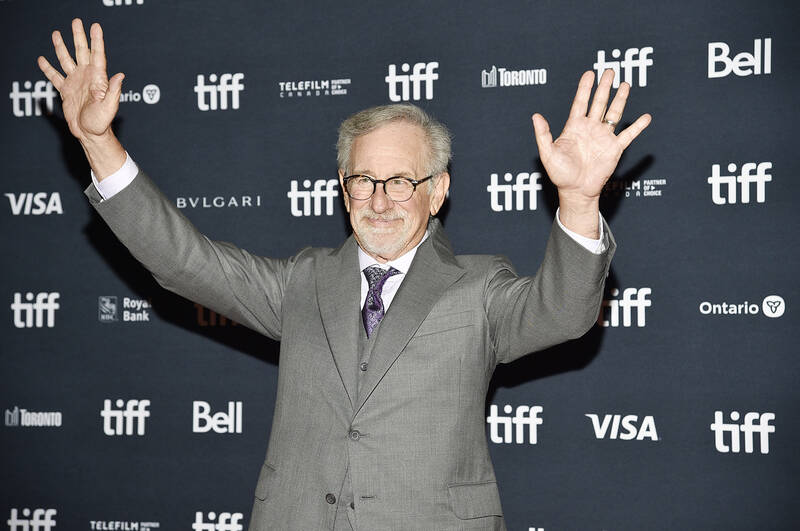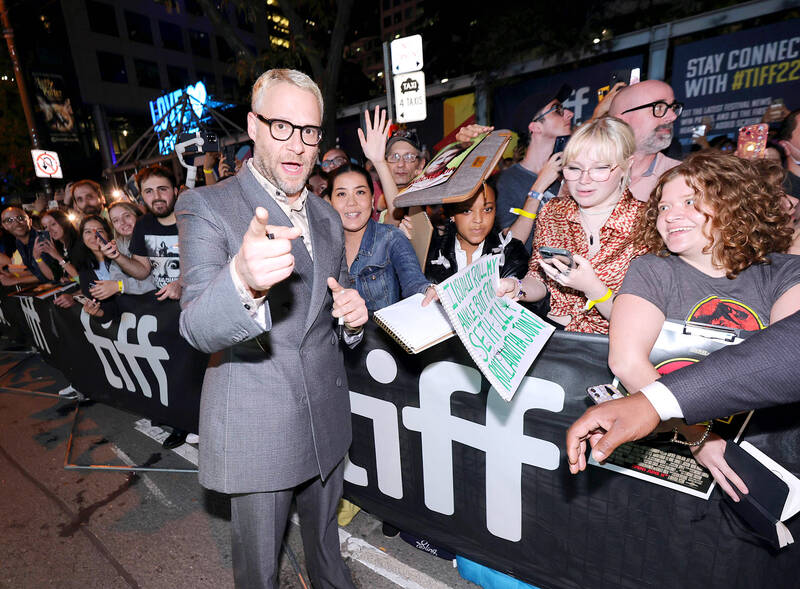Steven Spielberg premiered his much-anticipated The Fabelmans to thunderous applause at the Toronto International Film Festival, debuting his most autobiographical film and one the 75-year-old filmmaker said he’s been building toward his whole life.
The Fabelmans, which Spielberg wrote with Tony Kushner, draws extensively from the director’s own childhood — from his parents, played by Michelle Williams and Paul Dano in the film, and from his early formation as a filmmaker. The film opens with a timid young boy outside a cinema going to see his first movie (The Greatest Show on Earth). His mother encourages him: “Movies are dreams, doll.”
“It’s something obviously I’ve been thinking about for a long time,” Spielberg said on stage after the screening late Saturday. “I didn’t really know when I was going to get around to this. It is not because I decided to retire and this is my swan song. Don’t believe any of that.”

Photo: AP
Spielberg said he first talked about what would become The Fabelmans with Kushner during the making of Lincoln. The playwright, Spielberg said, played the role of therapist as Spielberg unloaded his memories. But it wasn’t until the pandemic that the director resolved to tell, for the first time, his own story.
“As things got worse and worse, I felt if I was going to leave anything behind, what was the thing that I really need to resolve and unpack?” said Spielberg.
Spielberg, whose three sisters were in the audience, later added: “This film is for me a way of bringing my mom and dad back. And it also brought my sisters — Annie and Sue and Nancy — closer to me than I ever thought possible. And that was worth making the film for.”

Photo: AFP
Universal Pictures will release The Fabelmans on Nov. 11 in New York and Los Angeles before expanding it nationwide Nov. 23. Its world premiere at Toronto — which happened to immediately follow Rian Johnson’s Glass Onion: A Knives Out Mystery at the Princess of Wales Theater — was a major event, and an unusual one. It was Spielberg’s first film at TIFF, and he said while introducing the film that it was his first time ever in a film festival’s official lineup.
The two-and-a-half hour film was immediately received as a grand and personal opus for Spielberg, all but certain to play a staring role at the Academy Awards. Aside from Williams, who is pregnant with her third child, and Dano, the cast includes Seth Rogen as a close family friend, a brief standout performance from Judd Hirsch, Jeannie Berlin and newcomer Gabriel LaBelle who plays Sammy Fabelman, the fictionalized young Spielberg.
“Steven was generous about letting us into his life,” said Dano, who said he had access to Spielberg’s old photographs, home movies and lengthy conversations over Zoom with the director. “The goal was to capture a life lived.”
While there are vividly drawn moments of movies transporting Sammy, Fabelmans may surprise some for how complexly it weaves filmmaking and family life. Cinema in Spielberg’s film is both a transformative power and something dangerous; a way to express genuine emotion and to hide from it. Kushner, a frequently collaborator with Spielberg, said the film demonstrates how “film is an unreliable friend.”
“It will take you to into a place of safety and right through safety is something unexpected and scary,” said Kushner. “It happens over and over again in the movie.”
The Fabelmans is populated by early experiments with 8-millimeter cameras, little movies made with family members and increasingly ambitious short films. All mirror Spielberg’s own first forays into filmmaking, though there are some differences.
“I made all the behind-the-scenes stuff in this movie much better than the actual films I made when I was Sammy’s age,” Spielberg said with a smile. “It was a great do-over.”

A vaccine to fight dementia? It turns out there may already be one — shots that prevent painful shingles also appear to protect aging brains. A new study found shingles vaccination cut older adults’ risk of developing dementia over the next seven years by 20 percent. The research, published Wednesday in the journal Nature, is part of growing understanding about how many factors influence brain health as we age — and what we can do about it. “It’s a very robust finding,” said lead researcher Pascal Geldsetzer of Stanford University. And “women seem to benefit more,” important as they’re at higher risk of

Eric Finkelstein is a world record junkie. The American’s Guinness World Records include the largest flag mosaic made from table tennis balls, the longest table tennis serve and eating at the most Michelin-starred restaurants in 24 hours in New York. Many would probably share the opinion of Finkelstein’s sister when talking about his records: “You’re a lunatic.” But that’s not stopping him from his next big feat, and this time he is teaming up with his wife, Taiwanese native Jackie Cheng (鄭佳祺): visit and purchase a

Mother Nature gives and Mother Nature takes away. When it comes to scenic beauty, Hualien was dealt a winning hand. But one year ago today, a 7.2-magnitude earthquake wrecked the county’s number-one tourist attraction, Taroko Gorge in Taroko National Park. Then, in the second half of last year, two typhoons inflicted further damage and disruption. Not surprisingly, for Hualien’s tourist-focused businesses, the twelve months since the earthquake have been more than dismal. Among those who experienced a precipitous drop in customer count are Sofia Chiu (邱心怡) and Monica Lin (林宸伶), co-founders of Karenko Kitchen, which they describe as a space where they

April 7 to April 13 After spending over two years with the Republic of China (ROC) Army, A-Mei (阿美) boarded a ship in April 1947 bound for Taiwan. But instead of walking on board with his comrades, his roughly 5-tonne body was lifted using a cargo net. He wasn’t the only elephant; A-Lan (阿蘭) and A-Pei (阿沛) were also on board. The trio had been through hell since they’d been captured by the Japanese Army in Myanmar to transport supplies during World War II. The pachyderms were seized by the ROC New 1st Army’s 30th Division in January 1945, serving